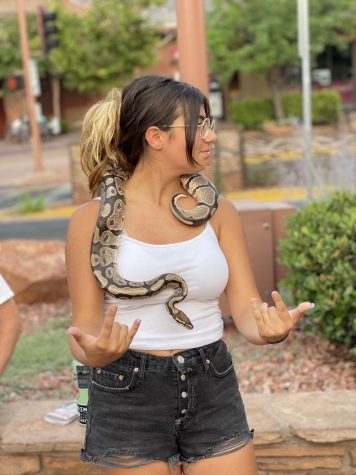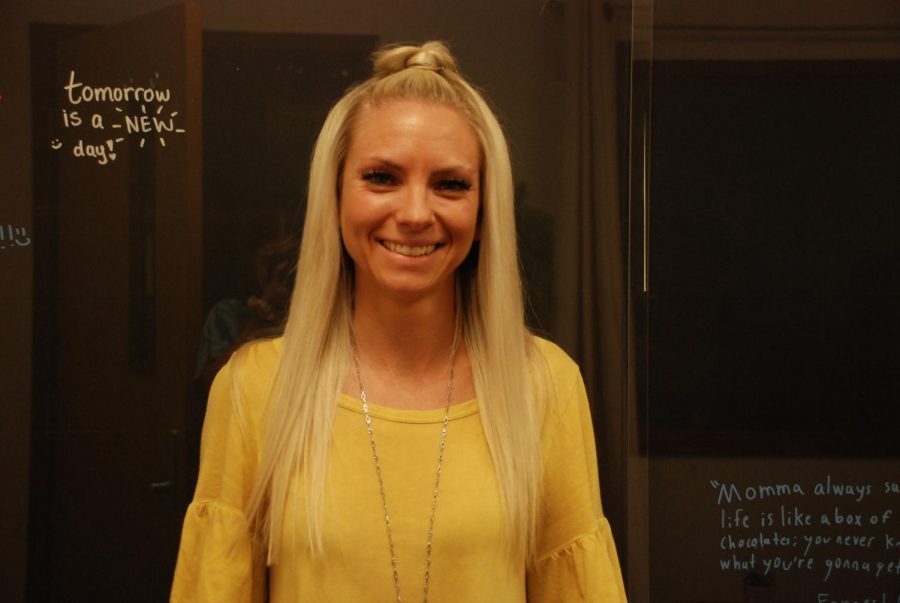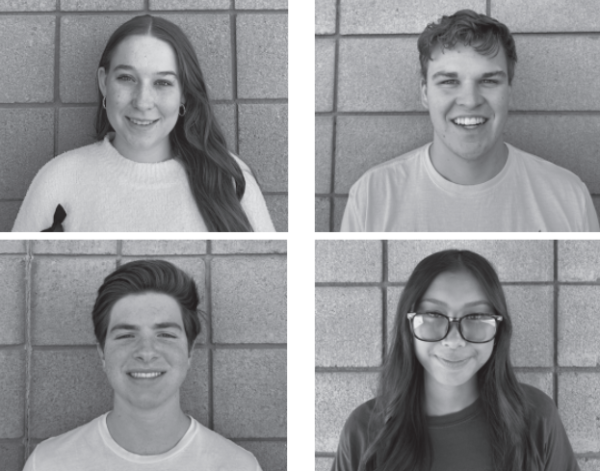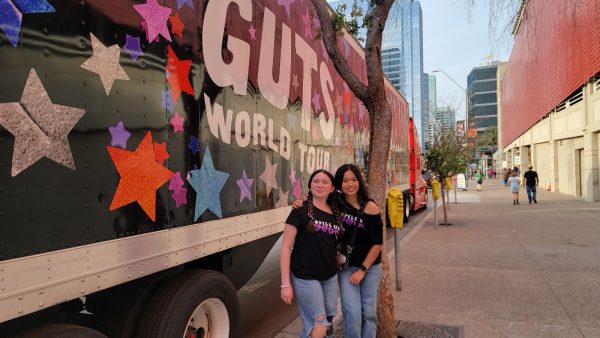Defining mental health: Q and A with on-campus social worker Lindsay Taylor
Lindsay Taylor has been working at Perry for four years now. She is available on campus Mondays, Wednesdays, and Fridays.
MN: Do you think that there’s a stigma surrounding mental health?
LT: I do, but I think it’s more in society and with older generations. I actually think that the [high school students’] generation is much better about talking about mental health and seeking mental help… I also think that… there’s still really a lack of good mental healthcare services out there. Again, leaders [in education]…, I think we’re still getting on board with really what’s needed to help with mental health concerns.
Madeleine Nseir: How would you define specifically mental health?
Lindsay Taylor: I think mental health is a state of being, so we’re either taking care of our mental health and we’re doing well or we’re struggling with our mental health and we’re not doing well… I think you can have mental health struggles which would be, you know, everybody struggles to a degree sometimes with anxiety, with depression… but if it hits a point where it’s interfering with daily life and that kind of thing, I would say it’s more mental illness. And that’s the kind of stuff you want to get treated.
MN: A lot of lines get blurred between mental health and overload of stress. How would you differentiate the two?
LT: … If you kind of worry or you’re stressed out about a test, maybe even some test anxiety, that’s not necessarily clinical anxiety. I would say that feeling stressed, but still being able to move on with your day or move on with your life, or feeling anxious with still being able to move on with your day, with your life, that’s normal. Or feeling sad here and there? That’s normal. But if it’s sadness that’s day after day that gets worse and worse, that’s interfering with your daily life? That would be more like depression… same with anxiety and same with stress. If it’s impacting your daily life and your ability to come to school or your ability to do anything outside of school, that’s when I would say you need to worry and it’s more about the mental health concern.
MN: What advice would you give to students who are struggling with their mental health or an overload of stress?
LT: I think first and foremost, reaching out for help if you’re feeling overwhelmed to the point that you can’t handle it. Again, you can talk to me, it’s confidential. It’s only if you talk about self-harm and that kind of thing [that a parent will be contacted]. But I want to mention, I’ve been doing this for suicide awareness week because I do hear students express that a lot that they’re concerned about talking to an adult if their friend is having suicidal thoughts or themselves because of their parents, you can call Teen Lifeline, that’s always an option because it’s confidential and they don’t have to contact parents. If somebody’s to the point that they have a plan, they’ll contact police, but otherwise it’s a confidential thing and teens can call without parents being notified. So anyways I think that’s an important thing to keep in mind, but reach out for help. And then, I would say just making sure that you’re taking care of yourself too. Practicing self-care, that can look different for different people, but I think that that’s a really important thing. I always say for overwhelm and stress with school, I tell kids to take one thing at a time… Make a list of all the things you have to do, but only look at one thing at a time. So don’t worry about everything else… and just take it one thing at a time. I think a really important thing to keep in mind is that most things in life are temporary so if you’re struggling now, life ebbs and flows. That’s just like keeping the hope piece when you’re struggling… Join a support group… We’re really trying to build that up because the kids that have joined it, it’s helped them a ton. It’s a great way to connect with other students and hear from them their perspective. For example, we have a support group where there’s a senior and a couple freshmen and she [the senior] is like, “I was sitting in your guys’ position.” She can relate and she can tell them how far she’s come and how things change. It has. It’s gotten better for her. A support group is a great way to hear from other students and to hear how they got through things and to see that, “Oh yeah I was in your position once and you can feel better. Come out the other side.”…
MN: Within the past few years, the Good Samaritan law was passed which allows teens to call 911 for their unconscious friend without prosecution for underage drinking. How do you feel about the law and how do you think it will affect teens?
LT: I am a huge advocate on that. Obviously, my son passed away from a fentanyl overdose and his friends didn’t call because they were afraid of getting in trouble. I think, first of all, we need a lot of awareness around that law because there were people that didn’t even realize that that law existed. So A) I think we need to put the word out there more that that law does exist. Then B) I think that kids need to be aware and understand that you can save a life and you won’t get in trouble and that’s what that law protects… I really think that what [students] can do, what teens can do, is spread the word, like, “Hey there’s this law that if your friend’s in trouble don’t be afraid to call 911.” I think that’s the biggest thing is that we need to spread that message and that word.
MN: What kind of students can come to the mindfulness room?
LT: Anybody. Anybody can come, so you don’t have to be even having a struggle to come here, but it’s obviously particularly helpful if you are struggling with any type of mental health concern. Again if you’re to the level of it interfering with your daily life, I think you should definitely come speak to somebody because we have resources. We can refer you out to therapists, but I can also meet with you here at school and just help you manage school and get through your day. But if you need more intensive help, then we can refer you to outside services…
MN: What is the procedure to come here?
LT: You have to check in with counseling, so Ms. Hendon is the counseling secretary. You would check in with her and she would just make sure that I’m here before they send you down because I’m only part time now. You can also make an appointment with me, so if I’m not here, you can get on my schedule for an appointment and they also have the QR codes across campus where kids can make appointments…
MN: What resources are available here in the mindfulness room?
LT: We do support groups here. We just recently brought on two interns through this company called Everybody Matters and they will be meeting with students individually. So if there are students that need a weekly consistent meeting with somebody that’s what their purpose is… We have the counseling support groups. There’s a club called Pumas4Pumas… So that’s… getting big in terms of the mental health support on campus… I meet with students individually for counseling. In this room, we were doing mindfulness sessions prior to covid where I was bringing classes in and doing that. We haven’t restarted that yet, but that’s something I would like to eventually get back to…
MN: A lot of students express concerns for coming here for fear that their information’s going to be given to a parent or a counselor. What is the confidentiality policy here?
LT: I don’t call a parent and say that I met with a student. The only time that a parent is notified is that if the student talks about something that is a safety concern, like hurting themselves or they say that they’re going to hurt somebody else or that somebody else is hurting them, so if they report abuse, those kind of things I have to tell a parent or report to law enforcement if it was like an abuse situation. Otherwise if it’s… outside of a safety concern… I don’t [talk to parents] I just meet with students. I don’t necessarily talk to parents unless me and the student agree that they want me to send resources… But otherwise, it’s confidential. It stays between us in here.

Madeleine Nseir is a senior in her second year with The Precedent. She is co-president of on-campus club, Operation Smile, and in the Puma Regiment. Other...




